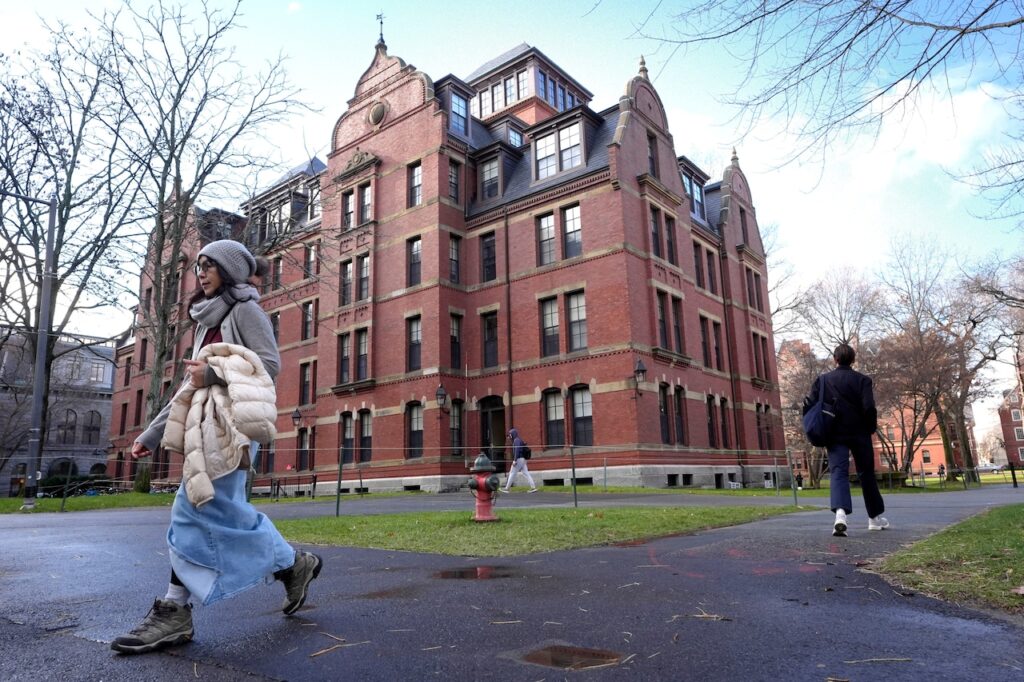The Trump administration has revoked a key certification that allows Harvard University to study there, according to a Thursday letter from U.S. Secretary of Homeland Security Kristi Noem.
About 27% of Harvard’s undergraduate and graduate students are international, according to 2024 to 2025 data.
It comes after Noem forced the institution in April to submit detailed records about foreign students or lose a key certification that allows international students to attend the institution.
Read more: Read the Trump admin letter barring Harvard from enrolling international students
Harvard provided the federal government on April 30 “information required by law” about foreign students’ illegal activity and records.
Noem said it wasn’t “responsive” to her requests, and upon another opportunity to comply, it failed again, she said in the letter.
Harvard will have another opportunity if it provides detailed records about international students within 72 hours, according to the letter.
“This administration is holding Harvard accountable for fostering violence, antisemitism, and coordinating with the Chinese Communist Party on its campus,“ Noem said on social media.
“It is a privilege, not a right, for universities to enroll foreign students and benefit from their higher tuition payments to help pad their multibillion-dollar endowments,” she said.
Read more: Harvard changes admissions policy, offering foreign students a ‘backup plan’
Harvard spokesperson Jason Newton said in a statement that the government’s action is “unlawful.”
“We are fully committed to maintaining Harvard’s ability to host international students and scholars, who hail from more than 140 countries and enrich the University — and this nation — immeasurably. We are working quickly to provide guidance and support to members of our community. This retaliatory action threatens serious harm to the Harvard community and our country, and undermines Harvard’s academic and research mission.”
What is the certification?
The Student and Exchange Visitor Program, also known as SEVP, allows higher education institutions to issue visa application forms to prospective international students after admitting them. The forms are used to apply for a visa to enter the United States.
The certification requirements include that the school is operational and instructing students, has the necessary facilities and adequate finances to operate, provides instruction to a degree or objective and meets state requirements to operate, according to the Department of Homeland Security website.
Read more: Trump is threatening to block international students from Harvard. Is that legal?
Institutions are recertified every two years, but can be evaluated at other points in time if they have information suggesting that it isn’t complying with regulations.
If the certification is taken away, an institution isn’t allowed to enroll international students. Current students would have to choose between transferring to another institution, leaving the U.S., or changing their immigration status, according to the ICE website.
An example of the certification being stripped occurred at Herguan University in California in 2016 after its CEO pleaded guilty to providing fraudulent documents to the Department of Homeland Security, according to East Bay Times.
A growing fight
Harvard has been in a battle with the federal government since April. There has been a wave of federal research grant terminations at Harvard University, in addition to a $60 million in multi-year grants,$450 million cut and a $2.2 billion freeze.
U.S. Education Secretary Linda McMahon has also told the institution that the federal government would be barring Harvard University from acquiring new federal grants while the university continues to refuse to comply with the administration’s demands for change on its campus.
Harvard President Alan Garber wrote in a letter to U.S. Secretary of Education Linda McMahon that they share the same “common ground,” but the university “will not surrender its core, legally-protected principles out of fear.”
Garber pushed back on the administration through a lawsuit in April. The institution argues that its constitutional rights had been violated by the government‘s threats to pull billions of dollars in funding if the school didn’t comply with demands for an overhaul.Following the $450 million announced cuts, the university amended its lawsuit.
“No government — regardless of which party is in power — should dictate what private universities can teach, whom they can admit and hire, and which areas of study and inquiry they can pursue,” the suit reads.
Due to the federal cuts, Harvard announced that it was committing $250 million of “central funding” to support research impacted by suspended and canceled federal grants.


